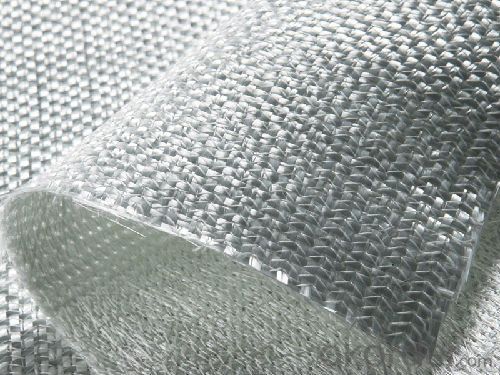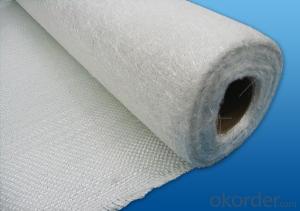Fiber Glass Stitched Combo Mat(E-glass Fiber)
- Loading Port:
- Shanghai
- Payment Terms:
- TT or LC
- Min Order Qty:
- 20000 kg
- Supply Capability:
- 200000Kg Per Month kg/month
OKorder Service Pledge
OKorder Financial Service
You Might Also Like
1.Brief Introduction
E-Glass Stitched Chopped Mat (450g/m2~900g/m2) is made by chopping continuous strands into chopped strands and stitching them together. The product has a maximum width of 110 inches. This product can be used in manufacturing boat manufacturing and tubes.
2.Product Features
Fast breakdown in styrene
Good wet-through and fast wet-out in resins, rapid air lease
Superior acid corrosion resistance
3.Product Specifications
Item | Over Density | Moisture Content | Chop Density | Polyester Yarn | Width |
(g/m2) | (%) | (g/m2) | (g/m2) | (mm) | |
EMK300 | 309.5 | ≤0.15 | 300 | 9.5 | 50-3300 |
EMK380 | 399 | 380 | 19 | ||
EMK450 | 459.5 | 450 | 9.5 | ||
EMK450 | 469 | 450 | 19 | ||
EMC0020 | 620.9 | 601.9 | 19 | ||
EMC0030 | 909.5 | 900 | 9.5 |
Special specification can be produce according to customer requirements.
4.FAQ
Packaging:
E-Glass Stitched Chopped Strand Mat is wound onto a paper tube which has an inside diameter of 76mm and the mat roll has a diameter of 275mm. The mat roll is wrapped up with plastic film,and then packed in a cardboard box or wrapped up with kraft paper. The rolls can be horizontally placed. For transportation, the rolls can be loaded into a cantainer directly or on pallets.
Storage:
Unless otherwise specified, E-Glass Stitched Chopped Strand Mat should be stored in a dry, cool and rain-proof area. It is recommended that the room temperature and humidity should be always maintained at 15℃~35℃ and 35%~65% respectively.
- Q:Can fiberglass mat tissue be used for HVAC ducting?
- Yes, fiberglass mat tissue can be used for HVAC ducting. Fiberglass mat tissue is a lightweight material made from glass fibers that are bonded together with a resin. It has excellent thermal insulation properties, which makes it suitable for use in HVAC systems where temperature control is important. Additionally, fiberglass mat tissue is resistant to moisture and chemicals, ensuring durability and longevity in ducting applications. It is also easy to install and can be customized to fit different duct sizes and shapes. Overall, fiberglass mat tissue is a reliable and efficient choice for HVAC ducting.
- Q:Is fiberglass mat tissue resistant to oil and grease?
- Yes, fiberglass mat tissue is resistant to oil and grease. The composition of fiberglass mat tissue consists of fine strands of glass fibers bonded together with a resin. This resin acts as a barrier that prevents oil and grease from penetrating through the mat tissue, making it resistant to these substances. Additionally, fiberglass itself is known for its non-reactive properties, which further enhances its resistance to oil and grease. Therefore, fiberglass mat tissue is an ideal material for applications where contact with oil and grease is expected, such as in industrial settings or automotive components.
- Q:Can fiberglass mat tissue be used for swimming pool construction?
- Yes, fiberglass mat tissue can be used for swimming pool construction. Fiberglass mat tissue is a versatile material that is commonly used in the construction industry for its strength, durability, and resistance to water and chemicals. It is often used as a reinforcement material for swimming pool shells, providing added structural integrity and preventing cracking or leaking. Additionally, fiberglass mat tissue is lightweight and easy to work with, making it a popular choice for pool builders. However, it is important to ensure that the fiberglass mat tissue used for swimming pool construction meets the necessary standards and regulations to ensure the safety and longevity of the pool.
- Q:Does fiberglass mat tissue provide any moisture insulation?
- No, fiberglass mat tissue does not provide any moisture insulation.
- Q:How does fiberglass mat tissue perform in terms of UV resistance?
- Fiberglass mat tissue generally has good UV resistance. UV resistance refers to the ability of a material to withstand the harmful effects of ultraviolet radiation from the sun without degrading or deteriorating. Fiberglass mat tissue is usually manufactured using a combination of fiberglass and a binder material, which provides strength and integrity to the tissue. The fiberglass component in the mat tissue provides inherent UV resistance. Fiberglass is known for its durability and ability to resist degradation from UV exposure. It is a non-porous material that does not absorb UV radiation, making it less susceptible to damage caused by the sun's rays. Additionally, some manufacturers may apply a UV-resistant coating or treatment to the fiberglass mat tissue to enhance its UV resistance. This coating or treatment can further protect the tissue from the damaging effects of prolonged exposure to UV radiation. Overall, fiberglass mat tissue performs well in terms of UV resistance. It is a durable material that can withstand the harmful effects of UV radiation, making it suitable for applications where prolonged exposure to sunlight is expected. However, it is important to note that the specific UV resistance of fiberglass mat tissue may vary depending on the manufacturing process, quality of materials used, and any additional coatings or treatments applied.
- Q:What is the cost of fiberglass mat tissue?
- The cost of fiberglass mat tissue can vary depending on factors such as the thickness, size, and brand. It is best to check with suppliers or retailers for specific pricing information.
- Q:Can fiberglass mat tissue be used for composite panel manufacturing?
- Yes, fiberglass mat tissue can be used for composite panel manufacturing. It is a common material choice for reinforcing composite panels due to its high strength, durability, and compatibility with various resin systems. The fiberglass mat tissue provides structural integrity and improved strength-to-weight ratio to the composite panel, making it suitable for a wide range of applications.
- Q:Is fiberglass mat tissue biodegradable?
- No, fiberglass mat tissue is not biodegradable. Fiberglass is a synthetic material made from fine fibers of glass, which are woven together to create a strong and durable material. These fibers do not break down naturally over time, making fiberglass mat tissue non-biodegradable.
- Q:Is fiberglass mat tissue suitable for insulation in educational facilities?
- Yes, fiberglass mat tissue is suitable for insulation in educational facilities. It offers excellent thermal insulation properties, is easy to install, and provides effective soundproofing. Additionally, it is fire-resistant, durable, and cost-effective, making it a practical choice for educational buildings.
- Q:Does fiberglass mat tissue require any special surface bonding agents?
- Special surface bonding agents are necessary for fiberglass mat tissue. It is commonly used as a reinforcement material in industries like construction, automotive, and aerospace. To achieve a strong bond between the fiberglass mat tissue and the substrate, a suitable bonding agent or adhesive is needed. The bonding agent plays a crucial role in creating a durable and robust bond between the fiberglass mat tissue and the applied surface. It enhances the overall strength, integrity, and performance of the composite material. Additionally, it prevents delamination or separation of the fiberglass mat tissue from the substrate. The type of bonding agent required may vary depending on the specific application and the substrate's properties. Typically, epoxy-based bonding agents are widely used for bonding fiberglass mat tissue due to their excellent bonding strength, chemical resistance, and durability. Before applying the bonding agent, it is essential to thoroughly clean the surface and remove any contaminants that may affect adhesion. The bonding agent can then be applied using appropriate techniques such as brushing, spraying, or rolling. In conclusion, special surface bonding agents are necessary for fiberglass mat tissue to ensure proper adhesion and enhance the performance of the composite material. The choice of bonding agent depends on the specific application and substrate properties. Adequate surface preparation is also crucial for achieving a strong and durable bond.
1. Manufacturer Overview |
|
|---|---|
| Location | |
| Year Established | |
| Annual Output Value | |
| Main Markets | |
| Company Certifications | |
2. Manufacturer Certificates |
|
|---|---|
| a) Certification Name | |
| Range | |
| Reference | |
| Validity Period | |
3. Manufacturer Capability |
|
|---|---|
| a)Trade Capacity | |
| Nearest Port | |
| Export Percentage | |
| No.of Employees in Trade Department | |
| Language Spoken: | |
| b)Factory Information | |
| Factory Size: | |
| No. of Production Lines | |
| Contract Manufacturing | |
| Product Price Range | |
Send your message to us
Fiber Glass Stitched Combo Mat(E-glass Fiber)
- Loading Port:
- Shanghai
- Payment Terms:
- TT or LC
- Min Order Qty:
- 20000 kg
- Supply Capability:
- 200000Kg Per Month kg/month
OKorder Service Pledge
OKorder Financial Service
Similar products
New products
Hot products
Related keywords




























